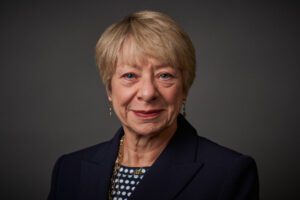
Born in London, England, and recruited from Austin, Texas, where she had spent over two decades as the founding CEO of Triton Ventures, Laura Kilcrease served as a member of the Alberta Research and Innovation Advisory Committee for seven years prior to joining Alberta Innovates (AI) in 2017.
She is widely recognised as a key contributor to the transformation of Austin from its dependence on oil revenue to high-tech prosperity and ultimately becoming the United States’ #1 city of choice for entrepreneurs.
Having spent over 25 years commercialising technology, Ms. Kilcrease brings an extraordinary track record in innovation ecosystem performance and design. In addition to myriad accomplishments delivered during her time in Texas, since arriving at AI she has steered the organisation’s restructuring, spearheaded a program assessment initiative, and launched Inventure$, an annual gathering of innovators, investors, industry leaders, and global researchers, which PricewaterhouseCoopers estimated catalysed some $200M in potential deal flow in 2019.
These achievements have not gone unnoticed, and she has been formally recognised with the Ernst & Young Entrepreneur of the Year Award, the Austin Business Journal’s Profiles in Power Award, and the University of Texas McCombs School of Business Trailblazer Award.
A dedicated community builder, Laura has supported the Women’s Leadership Advisory Board of Harvard University’s Kennedy School of Government, the Beyster Institute, World Congress for Information Technology 2006, and the IC² Institute at The University of Texas. She currently serves on the board of the University Federal Credit Union, one of the top 100 financial institutions of its kind in the U.S.
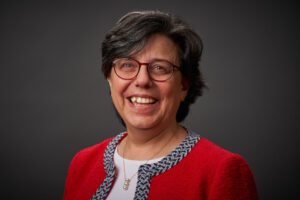
The term “multiculturalism” was coined by a Canadian, and is the bedrock of our society, which is one of the reasons CAAIN seeks out diversity of background and experience. We want our staff and board to bring a range of views to the table. Micheline Ayoub epitomises this value. Her list of accomplishments includes earning graduate degrees in Agronomy and Plant Breeding from McGill University and a BSc in Biology from The Lebanese University, as well as an extraordinary history of volunteerism. We cannot list them all, but how’s this for diverse? She has served as a first responder in a war zone, as a board member of the McGill Society of Montreal, and as a special advisor on sustainable development and strategic environmental directions to the Mayor of Maasser el Shouf, in Shouf, Lebanon. Her international education has been bolstered by skills honed working on intellectual property, research management, partnership development, the legal aspects of collaborative research, technology and knowledge transfer, granting-system management, peer review processes, program performance assessment, and governance. In short, she is an ideal addition to the board of an organisation with the dual mandates of supporting agri-food innovation and building a sustainable sectoral network.
When she isn’t forging and nurturing partnerships for My Intelligent Machines, a Montreal-based start-up leading the way in life sciences AI software, Dr. Ayoub enjoys singing in a choir, supporting her children’s school in various capacities, and walking her family’s very large, very playful malamute.
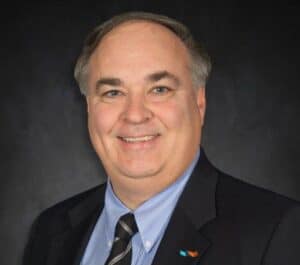
CAAIN has been fortunate to attract an extraordinary group of senior professionals with diverse agrifood-sector experience to serve on our board of directors. Nowhere is that more evident than in the two new directors who joined us in late 2024.
One of those is Joe Dales, the co-founder of RHA Ventures. Born and raised in the Ontario agricultural heartland of Bruce County, he grew up in a farming community and studied nearby, obtaining a BSc (Chemistry) from Western in London and an MBA from Waterloo’s Wilfrid Laurier.
Upon graduation, he launched a career in the ag sector, enjoying progressively senior roles at a variety of companies, including Pfizer Crop Protection, United Agri Products, First Line Seeds, Ciba Seeds, and Cyanamid Crop Protection. The latter was where he ended up in marketing management, developing skills that have served him well in his entrepreneurial endeavours. In 1998, Joe cofounded AgCareers.com and Farms.com and helped grow the businesses globally. In 2020, he sold his interest in the business prior to founding RHA Ventures, which invests in early-stage agrifood technology companies and has grown to a portfolio of 36 companies.
When asked why he continues to push the pedal to the metal, Joe answers simply, “I enjoy introducing innovations to farmers and I feel that in a small way, I am helping feed the world.” Given CAAIN’s mandate to fund innovation that will help meet the dietary needs of a growing global population, his fit with a position on our board is obvious. Beyond that, Joe has been a CAAIN friend and advocate since our 2020 launch, supporting our brand at every turn and providing valuable guidance whenever we approached him.
When he’s not seeking out potential investment opportunities or volunteering for various business and community organisations, Joe enjoys travelling with Sandra, indulging in their mutual passion for visiting farms and sampling food around the world.
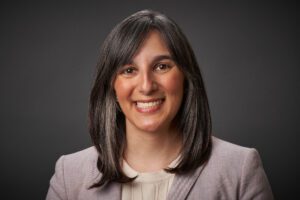
A Haligonian (it’s a real word…honest) by choice who loves Canada’s East Coast, Bethany Deshpande grew up in the agricultural heartland of Guelph, Ontario. She is a successful agtech entrepreneur who attributes her achievements to, “A series of accidents and good luck.” We beg to differ. Undergrad Arts and Education degrees from the Glendon Campus of York University, followed by an MSc and PhD in Environmental Biology earned at Université Laval, are evidence of extraordinary intellect bolstered by an exceptional work ethic. She needed both qualities to conceptualise, launch, and grow SomaDetect from a few folks working out of an apartment to 23 employees in Canada and the U.S.
Scientific innovation runs in the family, as she and her two partners founded the company to commercialise a discovery made by Bethany’s biophysicist father, Dr. Satish Deshpande. He noticed in 2014 that his low-resource medical diagnostic tests could measure fat content and somatic cells in milk. Two years later, SomaDetect was born with a mission to provide dairy farmers with tools that allow them for the first time to monitor milk quality and herd health.
Bethany’s passion for her work stems from its place at the intersection of agriculture, data, and sustainability, which, not coincidentally, aligns perfectly with her responsibilities as a member of CAAIN’s board of directors. When she’s not engaging in extensive community-based volunteer work, focusing particularly on agtech, food, science, and supporting women entrepreneurs like herself, Dr. Deshpande enjoys spending time in nature, creating pottery, painting watercolours, and singing.
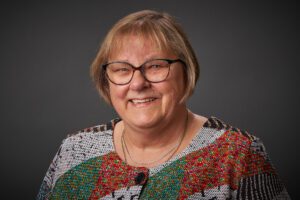
Originally from Ontario, Cornelia has spent the bulk of her professional life in Alberta, first as a veterinarian, then in a series of increasingly senior roles with government and at Alberta Innovates, from which she “retired” in January 2021 as Executive Director of the Smart Agriculture and Food (SAF) division. While leading SAF she was asked to spearhead the planning, development, and launch of CAAIN, eventually assuming the mantle of interim CEO, a role she relinquished in April 2021 upon the hiring of a permanent chief executive officer. A skilled strategic and operational planner, Dr. Kreplin brings decades-worth of provincial, national, and international agricultural experience and connections to CAAIN’s governance team, providing guidance and helping to grow the network.
When not contributing to various boards and advisory committees, Cornelia occasionally stops to spend time with her veterinarian husband and their Jack Russell Terrier.
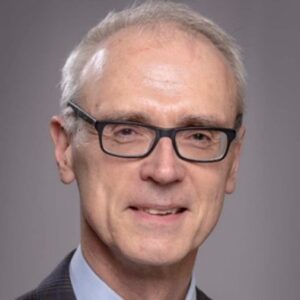
Rory McAlpine recently retired as Senior Vice President, Government and Industry Relations, with Maple Leaf Foods Inc.
Current directorships include the Canadian Agri-Food Policy Institute (Chair), Invest in Canada (Audit Committee Chair), Oak Bay Advisory Planning Commission, and the BC Premiers’s Task Force on Agriculture and Food Economy.
For 15 years at Maple Leaf Foods, Mr. McAlpine led the company’s engagement with government and industry partners on matters of public policy, innovation and investment support programs, regulatory affairs and international trade.
Mr. McAlpine served as Deputy Minister of the B.C. Ministry of Agriculture, Food and Fisheries from 2002 to 2005. Prior to that he obtained significant experience with Agriculture and Agri-Food Canada as Director General of the International Trade Policy Directorate and other roles. He started his career at the Trade Commissioner Service with overseas postings to Kuwait, Bangkok, and Brussels.
Mr. McAlpine received an M.A. (Hons) degree in Economics from the University of St. Andrews in Scotland and has also studied at the University of Geneva in Switzerland.

Patricia leverages her credentials as an accredited Professional Director (ICD.D) and leadership roles in law and compliance to oversee the strategic direction and governance of corporations. Patricia is a seasoned corporate director and lawyer, working with diverse organizations in the public, private, and non-profit sectors. She is a former General Counsel, Vice President, and Privacy and Compliance Officer, with extensive experience in contracts and corporate legal matters, including mergers and acquisitions, joint ventures, regulatory applications, privacy and compliance. Patricia is a passionate community builder with a strong understanding of innovation, transformation, and change management.
Patricia is the Board Chair of FutEra Power Corp., a renewable (geothermal) power producer and the Board Chair of Cavvy Energy Ltd., a publicly traded integrated midstream/upstream natural gas exploration and production company. She is also a board director and member of the revenue performance committee of Flair Airlines.
She has led board oversight of significant strategic decisions, capital projects and business transformations for many organizations, such as Calgary Co-op, Alberta Innovates, Canadian North (formerly First Air), MINDD Inc., City of Calgary Green Line Board, Real Estate Council of Alberta, Calgary Film Centre Ltd., YW Calgary, Calgary Economic Development, and cSPACE Projects. She has been Board Chair multiple times and Committee Chair of Governance, Human Resources, Nominations and Compliance Committees as well as member of Audit, Risk, and CEO Recruitment Committees.
Patricia has a law degree and a business degree from the University of Alberta and an MBA from Queen’s University, for which she completed an applied thesis in creating a culture of innovation in regulated entities. She was a certified Compliance and Ethics Officer and completed the Competent Boards certification program for board directors in ESG oversight. She was appointed as King’s Counsel in January 2014 (formerly Queen’s Counsel).
In 2022, Patricia received a Queen Elizabeth II Platinum Jubilee Medal. She was recognized by BMO Financial and Women Get on Board in 2021 as one of five Canadian leading women corporate directors. She was awarded Canada’s Top 100 Most Powerful Women by WXN in 2018 and 2019 and as Legal Advisor of the Year (2019) by Women in Finance Canada.
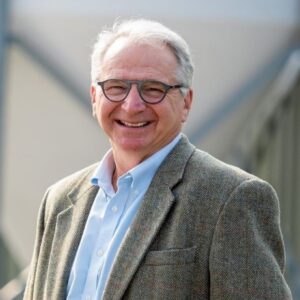
Tim Nelson has dedicated the majority of his career to advancing livestock research and innovation. Following upon a life long interest in emerging technology, he is the founder of a leading digital biosecurity platform that helps livestock producers prevent disease entry and respond rapidly to outbreaks. Tim also oversees a cutting-edge in-ovo egg sexing initiative on behalf of Egg Farmers of Ontario.
Previous to his entrepreneurial ventures, Tim served as the inaugural CEO of the Livestock Research Innovation Corporation, playing a key role in the development of modern livestock research facilities in Elora, Ontario. His first role in Canada was as Executive Director of the Poultry Industry Council of Ontario, and from 2009 he led PigGen Canada—a research collaboration among several of the world’s largest pig genetics companies.
Originally from Australia, Tim managed WestVic Dairy, a regional program of the Dairy Research and Development Corporation, and operated DemoDAIRY™, a farmer-owned research centre in western Victoria. He also developed Australia’s first ISO 9002-certified organic certification body—the Organic Food Chain—and founded The Organic Foods of Australia, exporting organic ice cream and vegetables to Japan.
Along the way, he established a backpackers hostel in Newfoundland—a venture that sadly closed in 2019 due to COVID-19.
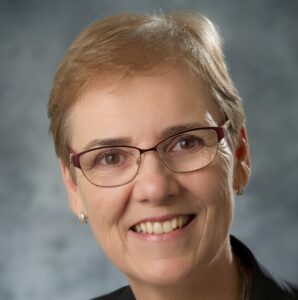
Growing up in Southwestern Ontario and focusing on becoming a veterinarian, Deb Stark never dreamed of a career in public service. In fact, she was practising in a rural community when she had a hankering for more education. The MBA at Wilfrid Laurier University seemed a good choice, as it was a generalist’s degree that would expose her to non-scientific thinking.
To make some extra money while in school, Deb took a parttime job as an extension vet with the Government of Ontario. A planned three-year stint morphed into a distinguished 30-year career that included six years as the province’s Chief Veterinary Officer, and culminated with her being appointed Deputy Minister of the Ontario Ministry of Agriculture, Food and Rural Affairs.
In 2016, wanting to try something new, she retired, and has been busier than ever, serving on numerous not-for-profit boards, participating in mentorship programs, becoming part of an angel investment community, and providing strategic advice to the Ontario Sheep Farmers. In her “spare time,” Deb helps out at her local long-term care facility and writes the occasional short story. She admits that along with all the success, there has been the occasional failure. For instance, in 2022 she and her husband tried to foster some cats, but they failed miserably—or at least, that’s the official humane society finding. The rest of us understand that the Starks merely fell in love with their charges and ended up adopting them. And really, if that is her definition of failure, we are very, very grateful Dr. Stark accepted our invitation to join the CAAIN Board of Directors.
But why add to an already full plate? “I’m interested in how technology is transforming our food system and redefining the role of a farmer. I believe it’s critical that Canadian agriculture adapt quickly. We are one of only a few net exporting countries, and have several natural advantages (land, climate, water). The world needs Canadian ag.” We hear that, Deb. We definitely hear that.
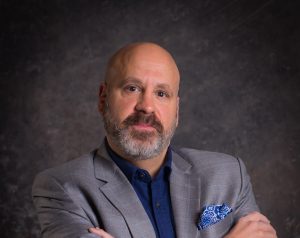
Fred Wall was most recently VP of Marketing and Digital Agriculture at Farm Credit Canada, where he was responsible for course-correcting challenges and managing complicated, leading-edge projects requiring innovative thinking. His three-pronged expertise in technology marketing, agriculture, and research contribute to his being a perfect fit with CAAIN’s board. An additional reason we’re so glad to have him is his stated preference for advising from a background position in his volunteer roles, which include supporting inner-city projects and helping children with special needs.
The passion for helping youth is a spillover from Mr. Wall’s personal life, as he and his wife completed what they called, “The Six Continents Project.” Over a 10-year period, before their children started leaving the nest, the family went on a series of trips that saw the Walls enjoy meaningful experiences on all six populated continents.
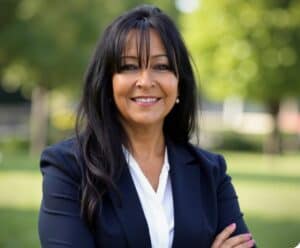
CAAIN has been fortunate to attract an extraordinary group of senior professionals with diverse agrifood-sector experience to serve on our board of directors. Nowhere is that more evident than in the two new directors who joined us in late 2024.
One of those is Kallie Wood, President and CEO of the National Circle for Indigenous Agriculture and Food (NCIAF), an Indigenous-led, non-profit organization dedicated to the advancement of reconciliation in the agriculture industry and the creation of a national dialogue for Indigenous agriculture.
Born and raised on Treaty Four Territory in Saskatchewan, Kallie is a proud member of Carry the Kettle Nakoda Nation. With a Master’s degree in Leadership and Management, and more than 35 years’ experience leading individuals, teams, and organisations, she brings to CAAIN’s governance team a deep understanding of relationship building, reconciliation, and education. Formerly the Senior Indigenous Advisor for the Saskatchewan Ministry of Agriculture, Kallie sits on several boards across Canada, and has garnered considerable attention outside the country, including being named one of 2023’s twenty-two most empowered and influential women internationally.
Given her standing as a leader in Canada and abroad, it stands to reason that Kallie receives far more offers than she could reasonably entertain. When we asked her what prompted her to accept the invitation to join CAAIN’s board, her response was both eloquent and moving. “We live in a fast-moving world characterized by ever-changing agri-food knowledge and technology. I feel I can bring an Indigenous voice to this table, providing a unique perspective based on traditional knowledge while networking to advance opportunities for Indigenous Peoples who will come after me.”
Kallie is the proud mother four children, foster mother to many more, and kokum to four wonderful grandchildren.
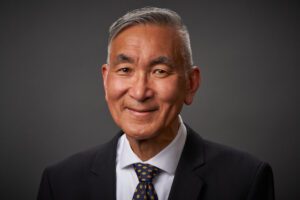
Dr. Rickey Yada is Professor and Dean, Faculty of Agricultural, Environmental and Life Sciences at the University of Alberta. From 2014 to 2024, he was Dean of the Faculty of Land and Food Systems at the University of British Columbia. Prior to UBC, Dr. Yada was at the University of Guelph where he held numerous leadership roles, including Chair, Department of Food Science, Assistant Vice President Research, Canada Research Chair in Food Protein Structure, and Scientific Director of the Advanced Foods and Materials Network (Networks of Centres of Excellence Canada).
Dr. Yada is a co-editor of Trends in Food Science and Technology and serves on the editorial boards of several journals. He is an advisor to other Boards of research and industry organizations, such as the Canadian Food Innovation Network and Saltagen Ventures Limited (Hong Kong). Other positions include Technical Advisor, CDL Rockies; External Advisory Committee Member at Arrell Food Institute; Member of the Scientific Advisory Panels at Bioenterprise Canada; Riddet Institute (New Zealand); and External Advisory Committee, Sydney Institute of Agriculture, The University of Sydney, Australia).
Dr. Yada is the Past President of the Deans Council of the Faculties of Agriculture, Food and Veterinary Medicine in Canada; Past President and Fellow of the Canadian Institute of Food Science and Technology, and the International Academy of the International Union of Food Science and Technology; as well as a Fellow of the Institute of Food Technologists, and Agricultural and Food Chemistry Division of the American Chemical Society. Dr. Yada has an honorary DSc from the University of Guelph and the Pro Scientia et Humanitate Medal from the University of Life Sciences in Lublin, Poland.